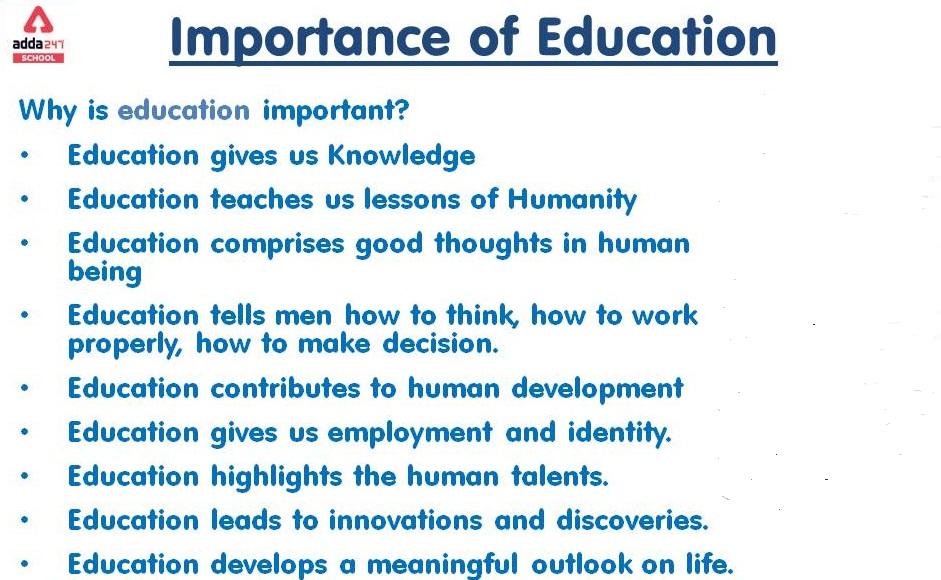Education is the cornerstone of personal and societal growth, playing a crucial role in shaping individuals’ futures. It equips people with knowledge, skills, and values necessary to navigate life’s challenges, fostering critical thinking and problem-solving abilities. Education promotes social equality by offering opportunities for upward mobility, bridging gaps across economic and social divides. Moreover, it empowers individuals to contribute to society’s progress, driving innovation and cultural enrichment. In an ever-evolving world, education remains a powerful tool for personal development and global advancement, making it essential for every individual’s success and well-being. Read the Importance of Education, Essay here in this post.
What is Education
Education is a tool with which one can conquer the world without harming anyone. The mental strength of a human Being is what makes it the strongest species in the entire Universe. By the mere use of our brains, we humans have evolved from living in dense forests to living a comfortable civilized life in merely about 5000 years.
Education is a process of acquiring knowledge, skills, values, beliefs, and habits through various formal and informal means. It encompasses both the formal education system, such as schools, colleges, and universities, as well as informal learning experiences gained through daily life, interactions with others, and self-directed study.
Education serves multiple purposes, including:
Transmission of Knowledge: Education facilitates the transfer of knowledge from one generation to another, ensuring the preservation and dissemination of culture, history, scientific discoveries, and societal norms.
Skill Development: Education equips individuals with the skills and competencies needed to succeed in various aspects of life, including academic, professional, personal, and social domains.
Personal Growth: Education fosters personal development by encouraging critical thinking, creativity, problem-solving, and self-reflection. It helps individuals discover their interests, talents, and aspirations, leading to greater self-awareness and fulfillment.
Socialization: Education plays a crucial role in socializing individuals into their respective cultures and communities. It teaches social norms, values, and behaviors, and promotes cooperation, empathy, and respect for others.
Empowerment: Education empowers individuals by expanding their opportunities, choices, and freedoms. It enables people to participate actively in society, advocate for their rights, and contribute to positive change.
Economic Development: Education is closely linked to economic development and prosperity. It enhances workforce productivity, fosters innovation and entrepreneurship, and reduces poverty by creating opportunities for employment and income generation.
Civic Engagement: Education prepares individuals to be informed, responsible citizens who actively participate in democratic processes, uphold democratic values, and contribute to the betterment of their communities and society as a whole.
Education is a lifelong journey that begins in early childhood and continues throughout one’s life. It is not limited to formal schooling but encompasses a wide range of learning experiences that occur in various contexts and settings. Ultimately, education empowers individuals to lead fulfilling lives, contribute to society, and adapt to an ever-changing world.
Important of Education
Learning, or the acquisition of knowledge, skills, values, morals, beliefs, habits, and personal development, is facilitated by education. Education began as a means of passing along cultural knowledge from one generation to the next. Today’s educational objectives increasingly include new concepts such as learner liberation, critical thinking about offered material, modern-day skills, empathy, and complicated vocational skills. Formal education takes place at educational and training facilities, is usually supervised by a teacher, and is normally structured by curricular goals and objectives. Formal education is compulsory in most regions until a specific age, and is usually separated into educational stages such as kindergarten, primary school, and secondary school. Nonformal learning can be used in conjunction with or instead of formal education. It is frequently held in community-based, workplace-based, or civil society-based settings, and is arranged according to educational arrangements, but in a more flexible manner. Finally, informal settings occur in everyday life, in the family, and any event that has a formative effect on the way one thinks, feels, or behaves, whether unintended or purposeful, may be deemed educational.
In practise, there is a continuum between highly structured and very informalized learning, and informal learning can take place in any of the three settings. Homeschooling, for example, might be defined as either nonformal or informal, depending on the structure. Teaching, training, storytelling, conversation, and guided study are all examples of educational methods that can be used in any situation. The term pedagogy refers to the teaching methodology.
5 Importance of Education
Here are five key importance of education:
- Empowerment: Education empowers individuals by providing them with the knowledge, skills, and confidence to pursue their goals and aspirations. It opens doors to various opportunities and enables people to make informed decisions about their lives, careers, and well-being.
- Economic Prosperity: Education is closely linked to economic prosperity and social mobility. It enhances workforce productivity, fosters innovation and entrepreneurship, and creates a skilled labor force that drives economic growth and development. Higher levels of education are associated with higher incomes and better job prospects, thereby reducing poverty and inequality.
- Social Cohesion: Education promotes social cohesion and harmony by fostering understanding, tolerance, and respect for diversity. It instills values such as empathy, cooperation, and mutual respect, which are essential for building inclusive and cohesive communities. Education also helps combat social injustices and discrimination by promoting equality of opportunity and social justice.
- Health and Well-being: Education plays a crucial role in improving health outcomes and promoting overall well-being. It increases awareness of health issues, encourages healthy behaviors, and facilitates access to healthcare services. Moreover, education empowers individuals to make informed decisions about their health and enables them to advocate for their own well-being and that of others.
- Personal Fulfillment: Education contributes to personal fulfillment and lifelong learning. It stimulates intellectual curiosity, creativity, and critical thinking, and enriches individuals’ lives by exposing them to new ideas, perspectives, and experiences. Education fosters personal growth and self-discovery, leading to greater self-awareness, confidence, and satisfaction with life.
Importance of Education Essay
Education policies and implementation were constitutionally defined by each of India’s constituent states until 1976. Education became a ‘concurrent subject’ after the 42nd amendment to the constitution was ratified in 1976. Since then, the federal and state governments have shared official responsibilities for education funding and administration. In 2005-6, the government managed 83.13 percent of elementary schools (Grades 1-8) and 16.86 percent of schools were under private management. According to the 2011 Census, approximately 73 percent of the population was literate, with males accounting for 81 percent and females accounting for 65 percent. Literacy was 77.7% in 2017–18, with 84.7 percent for males and 70.3 percent for females, according to the National Statistical Commission. The World Bank has invested nearly $2 billion in India’s education since 2000. There are more than 900 universities and 40,000 colleges in India. A large percentage of seats in India’s higher education system are reserved for historically disadvantaged Scheduled Castes, Scheduled Tribes, and Other Backward Classes under affirmative action rules. Reservations for these disadvantaged groups are allowed in universities, colleges, and similar institutions affiliated with the federal government up to 50%, but this varies by state. In 2014, Maharashtra had the largest rate of reservations in India, at 73 percent.
A wide range of philosophies, theories, and empirical research agendas underpin education. There are movements for educational reforms, such as enhancing the quality and efficiency of education to make it more relevant to students’ lives and efficient problem solving in today’s or tomorrow’s society, or for evidence-based education techniques. Some states and the United Nations have acknowledged the right to education. Global activities are aimed at accomplishing Sustainable Development Goal 4, which calls for universal access to high-quality education. The goal of altering public education is known as education reform. Debates over whether content or experiences result in an educated individual or an educated community have affected the meaning and practises of education. Reform intentions in the past have not always reflected present societal requirements. The assumption that large-scale, systematic changes in educational standards will result in social benefits in citizens’ health, prosperity, and well-being is a recurring theme of reform.
Although educational reform has occurred on a local level throughout history, the current concept of education reform is linked to the widespread adoption of compulsory education. The necessity of ensuring that all children and adults have access to free, high-quality, effective education has grown as a result of economic expansion and the spread of democracy. Modern education changes are becoming increasingly motivated by a growing understanding of what works in education and how to improve teaching and learning in schools. In other circumstances, however, the reformers’ goals of high-quality education have been misinterpreted as high-intensity education, with a narrow focus on teaching isolated, test-friendly subskills fast, regardless of long-term consequences, developmental appropriateness, or broader educational goals.
Importance of Education Speech
Today, I am honored to speak about one of the most vital pillars of human development — education. Education is not just about learning facts or acquiring degrees; it’s about opening our minds to a world of possibilities, igniting curiosity, and developing the skills that help us lead fulfilling lives.
Education shapes our future. It equips us with the knowledge to solve problems, think critically, and adapt to a rapidly changing world. In today’s global society, where technology and information are at our fingertips, education plays a crucial role in helping us navigate through complexities.
First, education empowers individuals. It gives us the tools to make informed decisions, fosters independence, and builds confidence. From basic literacy to advanced technical skills, education helps us grow as individuals and makes us better contributors to society.
Second, education drives social change. It bridges inequalities, opens up opportunities, and promotes fairness. Through education, we can challenge stereotypes, break down social barriers, and build a more inclusive and just society.
Third, education is a key to economic success. An educated workforce is essential for a nation’s development and prosperity. It enhances productivity, encourages innovation, and boosts economic growth. With education, people can pursue better career opportunities, thereby improving their standard of living.
Moreover, education nurtures creativity and innovation. It encourages people to think outside the box, explore new ideas, and push the boundaries of what is possible. History is full of examples where education has led to groundbreaking discoveries and advancements in science, medicine, technology, and the arts.
Finally, education promotes peace and stability. It fosters understanding, tolerance, and respect for different cultures and perspectives. An educated society is more likely to resolve conflicts through dialogue and cooperation rather than violence.
In conclusion, education is more than just a necessity; it is the foundation for building a better future for individuals, communities, and nations. By investing in education, we invest in the well-being and progress of humanity.
Why Education is Important in our Life
Education plays a crucial role in shaping individuals and societies for several reasons:
Personal Development: Education provides individuals with the knowledge and skills needed to navigate through life effectively. It helps in developing critical thinking, problem-solving abilities, and decision-making skills.
Empowerment: Education empowers individuals by expanding their opportunities and choices. It opens doors to various career paths and enables people to pursue their passions and interests.
Economic Growth: A well-educated population is essential for economic growth and development. Education enhances productivity, innovation, and competitiveness, leading to higher incomes and a better standard of living.
Social Cohesion: Education fosters understanding, tolerance, and respect for diversity, promoting social cohesion and harmony within communities and societies.
Health and Well-being: Education plays a vital role in improving health outcomes by increasing awareness of health issues, promoting healthy behaviors, and facilitating access to healthcare services.
Citizenship: Education equips individuals with the knowledge and skills needed to participate actively in civic life, engage in democratic processes, and contribute to the betterment of society.
Global Competence: In today’s interconnected world, education is essential for developing global competence, including cross-cultural understanding, communication skills, and awareness of global issues.
Overall, education is fundamental for personal growth, economic prosperity, social progress, and global sustainability. It empowers individuals to lead fulfilling lives and contributes to the advancement of society as a whole.
Importance of Education in Our Life Essay PDF
Importance of Education Poster Making










 Jawaharlal Nehru Essay for Students, Dow...
Jawaharlal Nehru Essay for Students, Dow...
 बाल दिवस पर निब�...
बाल दिवस पर निब�...
 My Best Friend Essay in English, Best Fr...
My Best Friend Essay in English, Best Fr...









